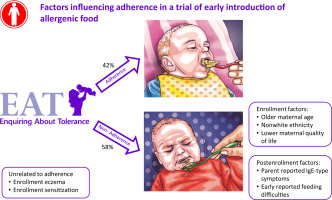当前位置:
X-MOL 学术
›
J. Allergy Clin. Immunol.
›
论文详情
Our official English website, www.x-mol.net, welcomes your
feedback! (Note: you will need to create a separate account there.)
Factors influencing adherence in a trial of early introduction of allergenic food.
Journal of Allergy and Clinical Immunology ( IF 11.4 ) Pub Date : 2019-12-01 , DOI: 10.1016/j.jaci.2019.06.046 Michael R Perkin 1 , Henry T Bahnson 2 , Kirsty Logan 3 , Tom Marrs 3 , Suzana Radulovic 3 , Rebecca Knibb 4 , Joanna Craven 3 , Carsten Flohr 5 , E N Mills 6 , Serge A Versteeg 7 , Ronald van Ree 8 , Gideon Lack 3 ,
Journal of Allergy and Clinical Immunology ( IF 11.4 ) Pub Date : 2019-12-01 , DOI: 10.1016/j.jaci.2019.06.046 Michael R Perkin 1 , Henry T Bahnson 2 , Kirsty Logan 3 , Tom Marrs 3 , Suzana Radulovic 3 , Rebecca Knibb 4 , Joanna Craven 3 , Carsten Flohr 5 , E N Mills 6 , Serge A Versteeg 7 , Ronald van Ree 8 , Gideon Lack 3 ,
Affiliation

|
BACKGROUND
The Enquiring About Tolerance (EAT) study examined whether the early introduction of 6 allergenic foods from 3 months of age in exclusively breastfed infants prevented the development of food allergy. The intervention was effective in the per-protocol analysis for allergy to 1 or more foods and for egg and peanut individually, but only 42% of early introduction group (EIG) children met the per-protocol criteria.
OBJECTIVE
We sought to identify which factors were responsible for nonadherence in the EAT study.
METHODS
Factors influencing adherence within the key early introduction period in the EIG (up to 6 months of age) were divided into enrollment and postenrollment factors, and their association with nonadherence was explored.
RESULTS
In an adjusted analysis, at enrollment, increased maternal age, nonwhite ethnicity, and lower maternal quality of life were independently and significantly associated with overall nonadherence in the EIG. Enrollment eczema and enrollment serum allergen-specific IgE sensitization to 1 or more foods (≥0.1 kU/L) were not related to overall nonadherence. After enrollment, 2 factors were significantly related to EIG overall nonadherence: parent-reported IgE-type symptoms with infant allergenic food consumption by 6 months of age and reported feeding difficulties by 4 months of age.
CONCLUSION
If early introduction of allergenic foods were to be considered a strategy to prevent food allergy, families of nonwhite ethnicity, those with older mothers, and those with infants with reported feeding difficulties or early-onset eczema would benefit from support to promote early and sustained consumption.
中文翻译:

影响早期引入过敏食品试验中依从性的因素。
背景 耐受性调查 (EAT) 研究调查了纯母乳喂养的婴儿从 3 个月大开始早期摄入 6 种过敏食物是否可以预防食物过敏的发生。该干预措施在对 1 种或多种食物以及单独对鸡蛋和花生过敏的符合方案分析中是有效的,但只有 42% 的早期引入组 (EIG) 儿童符合符合方案标准。目的 我们试图确定哪些因素导致 EAT 研究中的不依从性。方法 将影响 EIG 关键早期导入期(至 6 个月龄)依从性的因素分为入组因素和入组后因素,并探讨它们与不依从性的关系。结果 在一项调整后的分析中,入组时,孕产妇年龄增加、非白人种族和孕产妇生活质量较低与 EIG 总体不依从性独立且显着相关。登记湿疹和登记血清过敏原特异性 IgE 对 1 种或多种食物 (≥0.1 kU/L) 的敏感性与总体不依从性无关。入组后,有 2 个因素与 EIG 总体不依从性显着相关:父母报告的 IgE 型症状以及 6 个月大时食用婴儿过敏性食物的情况,以及 4 个月大时报告的喂养困难。结论 如果将早期引入过敏性食品视为预防食物过敏的策略,那么非白人家庭、高龄母亲以及婴儿报告喂养困难或早发性湿疹的家庭将受益于促进早期和持续性过敏的支持。消耗。
更新日期:2019-12-04
中文翻译:

影响早期引入过敏食品试验中依从性的因素。
背景 耐受性调查 (EAT) 研究调查了纯母乳喂养的婴儿从 3 个月大开始早期摄入 6 种过敏食物是否可以预防食物过敏的发生。该干预措施在对 1 种或多种食物以及单独对鸡蛋和花生过敏的符合方案分析中是有效的,但只有 42% 的早期引入组 (EIG) 儿童符合符合方案标准。目的 我们试图确定哪些因素导致 EAT 研究中的不依从性。方法 将影响 EIG 关键早期导入期(至 6 个月龄)依从性的因素分为入组因素和入组后因素,并探讨它们与不依从性的关系。结果 在一项调整后的分析中,入组时,孕产妇年龄增加、非白人种族和孕产妇生活质量较低与 EIG 总体不依从性独立且显着相关。登记湿疹和登记血清过敏原特异性 IgE 对 1 种或多种食物 (≥0.1 kU/L) 的敏感性与总体不依从性无关。入组后,有 2 个因素与 EIG 总体不依从性显着相关:父母报告的 IgE 型症状以及 6 个月大时食用婴儿过敏性食物的情况,以及 4 个月大时报告的喂养困难。结论 如果将早期引入过敏性食品视为预防食物过敏的策略,那么非白人家庭、高龄母亲以及婴儿报告喂养困难或早发性湿疹的家庭将受益于促进早期和持续性过敏的支持。消耗。











































 京公网安备 11010802027423号
京公网安备 11010802027423号